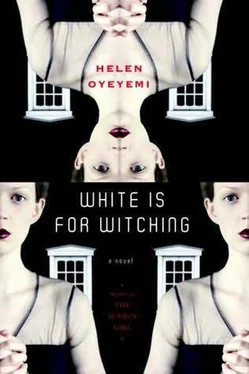— she saw the moon turn away
and the trees thrashing to save their roots
dogs in every house around that still stood, their barking distant as if from inside a single locked safe, the metal syncopating the sound of fear, saying dance, dance, don’t look around, dance
which she did, kicking and yelling like the first day in her GrandAnna’s house, only she was going so fast, where, why?
(Because plastic is not satisfying this night
As for beef, as for his Frenchie beef and fucking potatoes, ha ha)
Across the cliffs, Dover Castle was black. The sun was rising and the sea was changing colour, but the castle stayed within its lines, hunched in a black mess of shapes, and the vast bank of chalk it stood on seemed to stir in the water as if fighting the darkness that tried to climb down it.
Miranda knelt, her hands holding tight to the safety bars. Someone floated facedown at the foot of the cliff. The sea refused to take the body far from the shore and contented itself with tossing the corpse back and forth between its gentler waves.
We died this morning , she thought, then saw a scrap of colour. The body wore green. Whoever was floating, it was not her.
Sleep came at last, so miraculously and completely that she walked home through the empty streets unawake, her steps guided by the slightness of her shadow.
•
She didn’t realise she was asleep until a tapping on her door woke her.
“Yes?” Miranda said.
Her father came in, squinting, pretending he couldn’t see her in the dark of her room.
“Morning, Miri.”
“Morning,” she said, holding the question mark back with effort. She was no longer sure what the time was, or how to calculate. Also she thought she had locked her door.
“I’m about to interview someone to replace Ezma, but someone else is about to check out,” Luc began apologetically.
Miranda waved a hand. “Take their money, take the room key, print out a receipt,” she recited.
Luc nodded. “And check the room, please. So I know what needs doing.”
Miranda got out of bed to show her intention of moving soon. When he left, she sat down again. Her knees felt weak.
The woman Luc was interviewing was a black woman, short and round, with a placid gaze. An orange head wrap and an orange gown that made her formless, a vapour sinking through the sofa. She had a big, grey-black bird printed on each sleeve at the elbow; one was visible every time she lifted her teacup to her mouth. The birds had iron feathers and claws as long as their beaks, but they hid their heads behind their wings. She was wearing sandals despite the cold, and her toenails were painted bright orange. Her eyelids were daubed with a green that dotted her gown in emerald specks but turned khaki coloured on her skin. The woman spoke to Luc, unhurriedly and with a heavy African accent.
Miranda couldn’t take her eyes off the scars across the woman’s cheekbone, four horizontal stripes that cut a little farther along her face at each stage, like arrows at different stages of flight. They were smooth now but the cuts would have had to be made again and again on the same spot to make them hold. It took all she had not to ask the woman if she could still feel it. Miranda pressed the keys of the newly vacated room into Luc’s hand and the form with pencilled ticks beside items that needed tidying and replacing. Towels, sheets and so on.
“Thanks, Miri.” Luc looked at the woman who sat beside him on the sofa, then back at Miri. “This is Sade,” he told Miranda, then: “Sade, this is my daughter, Miranda.”
The introduction meant that Sade must be the one who was getting the job. Miranda, Luc and Sade got caught in a triangle of gazing. Luc cleared his throat and stood. “Sade, let me show you the house,” he said.
They started at the bottom and climbed up. Sade stopped in one of the guest rooms, her hand on the windowsill. “It’s so quiet,” she said.
All three of them listened without speaking. Now that she’d said it, it was true. The sounds in the other rooms were muted into vibrations. Someone closed a door, someone else ran down the stairs and you didn’t really hear these things, you felt them.
lived quite long. She didn’t die until 1994. A reason why Lily never felt motherless was that her mother was there with her, a door and a curtain away. It is a pity that Lily never understood this in a literal sense, but the concealment was necessary. Jennifer really meant to abandon her daughter, and how could I allow that? Jennifer was going to walk away from Anna and Lily in broad daylight. Anna was playing with her granddaughter, lying on her back in trapdoor-room with baby Lily on her stomach, cooing at her and comparing curl for curl. Jennifer had convinced herself that she hated them both, the child and the crone. She was modern and couldn’t countenance being held by four walls just because she’d had a baby at a young age. She was going to Milan with her Italian photographer boyfriend, and he would make her face famous. Anna and Lily could have each other, for all she cared.
One blessing born from Lily’s never knowing her mother is that Lily never knew how selfish her mother was. Jennifer was nineteen years old and thought a lot of herself and how she looked; her smooth ponytail, the crowded patterns on her silk shifts, the shine of her go-go boots. She had a tiny replica of a yew tree that she used to hold her earrings, Perspex hoops dangling off the branches. Each month or so the little tree had to be replaced because she’d gnawed it to an aged apple core. The earring tree was the last thing Jennifer put in her bag. It had to go on top of all her other things so that it wouldn’t get damaged. Jennifer had catlike eyes that she made stranger with kohl. Her gaze was cold and self-reflective
— am I pretty? Yes
— am I pretty?
— Yes — am I pretty?
Maybe she was not really like that. It’s just that I would prefer you to think that what happened to her was justified. I opened up for her. That is to say, I unlocked a door in her bedroom that she had not seen before, a door in the wall behind her dressing table.
She exclaimed, but not overmuch. She wasn’t particularly clever. She picked up her bag and went exploring. When she was safely down the new passageway, I closed the door behind her. It was the best sort of winter morning, cold but bright. That was the only sort of light Jennifer saw after that — it came through great windows and she couldn’t find her way away from them and out of me. Not that she tried hard. She was dazed.
I am not sure if she was lonely. She smiled to herself, and played little games of dress-up with herself, pulling clothes out of her bag and repacking them, switching earrings and examining herself in window glass when night fell. When her little earring tree was gone, she bit at her fingers until I brought her branches from the garden. For years and years, yes. Her hair greyed quickly, but she didn’t notice. When her shift dresses grew too dirty and tattered to play dress up with, I let Jennifer back into the main part, where Lily and Anna lived. Lily was a teenager by then. I had to be very careful, and quick, letting Jennifer in. Jennifer thought that Lily’s room still belonged to her. She ignored the new pictures and posters and tried Lily’s clothes on. She marvelled at them. She loved them. “When on earth did I buy this?” she’d ask herself, stroking the sleeves of a suede jacket, unbuttoning and rebuttoning a pin-striped waistcoat.
Don’t feel sorry for Jennifer. Why should you? She lived long and relatively well, and she was kept safe from those fears and doubts peculiar to her times. She was safe from the war that sickened what it touched from miles away, the new kind of image that lashed the conscience to the nerves, the pictures of Phnom Penh burning with a kind of pagan festivity, the young bones in the mud at Choeung Ek, the Cambodians and yellow-skinned priests sprawled in graves dug poorly and in great fear, graves they dug for themselves. It is true that Jennifer Silver never did leave home, but she had longed for an unusual life, and she certainly had that.
Читать дальше












